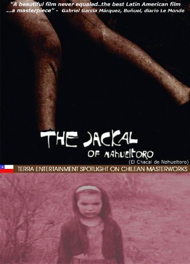| Release List | Reviews | Price Search | Shop | Newsletter | Forum | DVD Giveaways | Blu-Ray/ HD DVD | Advertise |
| Reviews & Columns |
|
Reviews DVD TV on DVD Blu-ray International DVDs Theatrical Reviews by Studio Video Games Features Collector Series DVDs Easter Egg Database Interviews DVD Talk TV DVD Talk Radio Feature Articles Columns Anime Talk DVD Savant HD Talk Horror DVDs Silent DVD
|
DVD Talk Forum |
|
|
| Resources |
|
DVD Price Search Customer Service #'s RCE Info Links |
|
Columns
|
 |
Jackal of Nahueltoro
|
||||
Third world films of the 1960s were often statements of social outrage, especially in Latin America where entire populations of indigenous peoples were shoved aside to make way for economic development, i.e., private profit. One of the most influential and respected of these pictures is Miguel Littin's The Jackal of Nahueltoro, a Chilean film structured not as a Marxist rant but as a reasoned portrait of a dysfunctional society. Although filmed in a gritty newsfilm style and lacking high production values, Littin's film conveys its message with an honesty that commands attention, making other social protest films seem puny by comparison.
Labeled The Jackal of Nahueltoro, José is condemned to death and sent to a prison where he responds well to calm order, discipline and the guidance of the prison chaplain (Héctor Noguera). José learns to read, take care of his appearance and apply himself to some crafts while awaiting his date of execution. The Jackal of Nahueltoro is an efficient and direct restaged account of real events. It leaps backward and forward in time and often adopts the guise of documentary footage, as when a journalist (Marcelo Romo) asks José probing questions and gets back only the simplest of honest responses. The earlier biographical passages are appropriately rough and ragged, starting with a feral, dirty 8 year-old José who stares at the camera like a bitter old man. Chilean society has no mechanism for dealing with 'God's children.' The local priest loses interest when he determines that the child has no church teaching and the local policeman uses him as free labor to take care of his pigs. José is treated as another farm animal by a succession of employers, until he matures into a brooding and potentially dangerous vagabond. A sign in a ragged dance-bar reads :"Bienvenido si traes plata -- Si no, Buenas Noches los pastores" which paraphrases into English as "You're welcome if you have money but beggars begone." José is thrown out immediately by the bulldog-like proprietress. He steals some clothing, for which he's given a cup of liquor. His murders are presented as the unexplainable actions of a deranged man, as José has shown no animosity to Rosa or her cute brood of adorable tots. He kills them as if he were killing sheep, to put them out of their misery. The whole point of The Jackal of Nahueltoro is that José lives to adulthood an invisible non-person, ignored and left to rot by society. The government then spends a considerable outlay of attention and resources to capture, try, convict, incarcerate and execute him. A slogan above the doors of the prison reads "Redimir, no Deprimir (roughly, "Redeem upward, not oppress downward") and José blooms in an environment free from alchohol, under the care of just one friendly priest. School lessons include a patriotic lecture about a Chilean war hero. When the time comes to face the firing squad, José has begun to learn to read and has successfully made a small guitar in shop class. He's just starting to find out what being a real human is all about. The newsman tries to glean some greater wisdom from the murderer's story but José understands nothing of society and only asks that his mother be spared as much pain as possible. He's certainly not idealized. While being interviewed before his execution, he's busy studying a magazine with pornographic pictures. The Jackal of Nahueltoro has no imposed "author's message" and demands no specific reaction, but we can't help but grieve for the dispossessed and marginalized "unproductive" populations in countries everywhere. Terra Entertainment presents The Jackal of Nahueltoro in a well produced DVD containing a good transfer of a mostly good film element. There are scratches and some damage. As with other Third World productions of this time the original photography varies greatly, with some scenes washed out and others too high in contrast. But the presentation, especially the soundtrack, is much better than the 16mm prints we used to see in film school. The movie was made through a University Film program and received glowing accolades from Latin cultural luminaries Pablo Neruda, Gabriel Garcia Márquez and Luis Buñuel. Director Miguel Littin is considered one of the leading talents of Third World Cinema. Forced to leave Chile during the right-wing coup of 1973, he continued working in Mexico and Europe. In 1985 he risked a penalty of death to smuggle himself back into Chile to make a series of films with three foreign camera crews about conditions under the Pinochet dictatorship. Disguised and carrying false papers, he even filmed within the Presidential Palace.
On a scale of Excellent, Good, Fair, and Poor,
The Jackal of Nahueltoro rates:
Review Staff | About DVD Talk | Newsletter Subscribe | Join DVD Talk Forum |
|
| Release List | Reviews | Price Search | Shop | SUBSCRIBE | Forum | DVD Giveaways | Blu-Ray/ HD DVD | Advertise |






